Hotel des Indes (The Hague)
Hotel Des Indes is a hotel located at the Lange Voorhout in The Hague, The Netherlands. It was constructed as a mansion in 1858. In 1881, it opened as a hotel.
| Hotel Des Indes | |
|---|---|
.svg.png) | |
%26groups%3D_1be907afaae9dc341c6fb76c644c96c56e60dbfd.svg)
| |
| Hotel chain | The Leading Hotels of the World, Ltd. |
| General information | |
| Status | National monument (monument ID number 17714) |
| Address | Lange Voorhout 54 - 56 |
| Town or city | 2514 EG The Hague |
| Country | The Netherlands |
| Coordinates | 52°05′02″N 4°18′48″E |
| Named for | Hotel des Indes (Batavia) |
| Inaugurated | May 1, 1881 |
| Owner | Westmont Hospitality Group |
| Technical details | |
| Floor count | 7 |
| Design and construction | |
| Architect | Arend Roodenburg |
| Other information | |
| Number of rooms | 92 (including suites) |
| Number of suites | 13 |
| Parking | 30 places (managed by the city) |
| Website | |
| www | |
History
Palace
This building was originally constructed as a city palace in 1858 for William Thierry, baron Van Brienen van de Groote Lindt, a personal advisor of king William III who often stayed in The Hague. The baron purchased three houses located at the Lange Voorhout and the Vos in Tuinstraat and had them demolished. One of these buildings, which was towards the back of the current building, was home to the museum dedicated to King William II. On this newly combined lot, he commission the construction of a new palace by architect Arend Roodenburg for a total sum of 150.000 guilders. The baron wanted a palace in the political capitol of The Netherlands for throwing parties and receptions. The mansion featured a spacious inner court, stables, residences for private guests and servants, and a ballroom. Originally one could enter with a horse-drawn carriage through the main entrance and have the carriage turn around, ready for departure, in the still-existing rotunda, which is now used as a tea room.
After the passing of the baron in 1863 the palace was inherited by his son Arnold, who found it too big for his needs and sold it a few years later. The palace became the property of hotelier François Paulez, who gifted it to his daughter Alegonda. Together with her husband Friedrich Wirtz she converted it into a hotel. Wirtz would become the first General Manager of the hotel.
Hotel
Grand Opening
The palace underwent four years of renovations and conversions to be opened on May 1, 1881 by prince Frederik, uncle of the king William III. It was named after then-famous Hotel des Indes (des Indes meaning Of the Indies) in Batavia hoping to attract travellers from the Dutch East Indies. On the facade of the building, the family coat of arms was replaced by the coat of arms of Batavia.
The hotel started of with 120 rooms and only one bathroom per floor, which was a luxury for its time. The hotel soon was reputed for its fine elegance. The start-up years saw many extravagant parties and exclusive banquets, but also a few harsh years. However, when in 1899 tsar Nicholas II of Russia initiated the first International Peace Conference of The Hague, the attendance of the many international leaders of governments and diplomats caused quite the upswing.
In 1894, manager Wirtz took over the Oranjehotel in the Scheveningen district of The Hague. The Hotel des Indes was placed under a newly created public company, Maatschappij tot Exploitatie van Hotel des Indes nv, and Christian Haller, who used to work at London's famous Savoy Hotel, became the new General Manager. It was him who managed to get Hotel des Indes to become the official hotel for the 1899 Hague Peace Conference after a long battle with other hotels in the city, which caused the hotel to become a famous "home away from home" for many international diplomats, royals, artists and scholars. Haller also invested heavily in innovation: by 1900 he had telephones, an intercom system connected to the front desk, bath tubs and washing stands featuring both hot and cold water installed in all rooms. In 1902, a hydraulic elevator was installed that ran on the pressure from the city's waterworks and architect Foek Kuipers was contracted to transform the inner court into a hall with a formal staircase and a large glass dome to cover the rotunda.
Between World Wars
The First World War was disastrous for business. By 1918, the hotel was in so much financial trouble that Haller decided to sell all the assets of the company. These were bought at the price of 1,25M guilders by the Nederlandsche Uitvoer Maatschappij, who planned to convert the hotel into an office building. This caused an outrage among citizens that wanted to keep the prestigious hotel. Notably due to pressure of mayor Patijn, the Dutch government was persuaded to take over the hotel. The transaction took place on May 2, 1919, for the then-spectacular price of 1.335.071 guilders and 19½ cents. The government wanted a large building on stand by that could instantly be used as crisis offices. The Ministry of Foreign Affairs liked the idea of having a large luxury hotel at their disposal. Despite that the government would own this building for decades to come, it continued to be operated as a hotel and Haller's wife, Mrs. Haller-Rey, and her brother, Mr. Henry Rey, both Monégasque. Mr. Rey was also Consul General of Monaco to The Hague and becomes sole director of the hotel in 1922.
In 1925 the hotel innovates once more by offering a gigolo. In that time, it was simply a male dancer who would entertain unmarried female guests; only later the image of the gigolo changed to the more extreme version of entertainment.
The 1930s started with some negative events. On January 23, 1931, ballerina Anna Pavlova died in her room (where now the reception area stands) from pneumonia.[1][2] A salon on the ground floor was later renamed after her.
A few months later, while hosting the celebrations for the 73rd birthday of Queen Mother Emma, the wiring for some of the lighting installed for the event had a short circuit and caused a fire that gutted the third floor and damaged the roof. Rey seized the opportunity during the reconstruction to add a fourth floor that was once planned but, up until then, never realized.
The Great Depression eventually also affects the hotel and the government needs to chip in once more to keep the doors open.
World War II
When World War II breaks out, Henry Rey and his wife try to flee to England. Rey and his two children succeed, but his wife was killed by Nazi forces that opened fire on the car near the harbour of Hoek van Holland. On May 1, 1940, the German ambassador, Julius von Zech-Burkersroda, and his staff were brought to the hotel as prisoners of war and were guarded for a full two weeks. On May 15, Henri Winkelman brought the news that The Netherlands had capitulated.
During the rest of the war, the Hotel Des Indes was a popular meeting place for the German occupiers in The Hague and is the Dutch headquarters for the Wehrmacht High Command. Deputy Manager Van der Wert, who was working at the hotel from 1923 until 1968, ran the place in Rey's absence.
Although Henri Rey died in England in 1942, his pigeon house on the roof of the hotel survives. Here the hotel management brought a small group of Jews to hide from prosecution during the Holocaust; they all survived the war.
Post-WWII difficulties
After the war, Jean Jacques Rey, the son of Henri Rey, moved to The Netherlands after leaving the RAF as a pilot and took over management of Hotel Des Indes in 1946. He also followed in his father's footsteps as Consul General of Monaco. He transformed the pigeon house in a room for his model trains which also figured a large flag of Monaco.
The fifties and sixties see a lot of changes for the tourism industry. Travellers are looking for more modern accommodations and Hotel Des Indes sees their number of guests diminish. Rey did manage to re-establish a stable clientele with some innovative changes to the hotel, but it would not be enough. In 1971 the hotel announces that they would have to close their doors. Prime minister Biesheuvel, who was a regular dining guest, alongside other politicians, such as Norbert Schmelzer and Arnold Tilanus, would have a last official dinner with his ministers on October 27, 1971. The three gentlemen decided to contact their private networks to save the hotel. They convinced entrepreneur Julius Verwoerdt to take over the management.
Verwoerdt buys the building back from the Dutch government for 1.380.000 guilders and contracts construction coordinator Altkemper for an intense renovation. Some notable changes are the old coal-burning stove that got removed from the kitchen, the replacement of the hardly-working central (steam) heating system, the replacement of all electric infrastructure, include wiring, the iconic central hall got rejuvenated and all rooms were renewed.
In 1979 Verwoerdt sells all of his actions of his company (which has grown to be a small hotel empire, counting 13 hotels) to the hotel subsidiary of UK-based Bass Breweries, Crest Hotels.
In the 70's and 80's, the hotel is the theatre of a series of tripartisan meetings to discuss then-controversial topics such as gay marriage, abortion and euthanasia, which were a taboo to discuss in parliament at the time. These meetings were later nicknamed The Des-Indes Deliberations and eventually led to the first "Purple" cabinet of the Netherlands.
The Era of Hotel Chains
In 1990, the Inter-Continental Group, which had already been entrusted with the management of the hotel since 1975, buys the all the assets of the hotel for 37,5M guilders, only to put it back up for sale a year later. A chairman of the company explains that the company worries it can't earn back the money they need to invest in the property, as the main clientele is made up of diplomats that are bound by strict budgets and so the company prefers to invest in the Amstel Hotel in Amsterdam, where the more-corporate clientele has less issues with higher room rates.[3] The chain will continue to manage the hotel until 2000.
In late 2002, Le Méridien Hotels & Resorts assumed management for the hotel.[4] In 2004–2005 the hotel received a new major renovation worth €28M. The new interior was designed by the French interior architect Jacques Garcia. Another floor was added, a few meters set back from the facade, and the white facade is painted yellow. After Le Méridien was acquired by Starwood Hotels and Resorts Worldwide, the hotel re-opened in November 2005 under the banner of The Luxury Collection.
In 2015, the hotel was sold to the Canadian Westmont Hospitality Group, which also owns the Bel Air Hotel in The Hague.
In December 2018, the hotel announced that it ended its management contract with Starwood, which had merged with Marriott International a few years earlier. The hotel has become part of the smaller The Leading Hotels of the World chain of luxury hotels.[5]
Notable guests
- Lourens Alma Tadema, a renowned Dutch-British painter, was the first guest in the hotel on 26 April 1881, which was before the official opening. He attended a family dinner celebrating the silver wedding anniversary of fellow artist Mesdag.[6]
- Empress Eugenie, wife of Napoleon III of France, in July 1881. She would stay a second time in 1887.[7]
- Sir John Whittaker Ellis, Lord Mayor of London, in 1882, accompanied by Sir Reginald Hanson and Sir William Anderson Ogg, sheriffs of London and Middlesex, during a return visitation after a visit from Queen Emma to London.[8]
- Mirza Malkam Khan, Persian diplomat, politician and state modernizer, in 1883.[9]
- Prince Prisdang of Siam, during a diplomatic mission, in 1883.[10]
- Prince Philippe of Belgium and his wife rented the entire second floor during their visit to The Hague in 1883.[11]
- Paul Kruger, president of South African Republic, visited The Hague in 1884[12] and again in 1900-1901 during his exile.[13]
- Michaël Romanov, Grand Duke of Russia, son of Emperor Nicolas I, in 1885, accompanied by his wife Princess Cecile of Baden.[14]
- Antoine Philippe, Duke of Montpensier, in 1885, travelling under the pseudonym "Duke of Bonanza".[15]
- Queen Natalija Obrenović, in 1888, travelling under the name "Countess Tokova".[16]
- Pierre Waldeck-Rousseau, minister and prime minister of France, in 1890[17]
- Abbas II of Egypt, viceroy of Egypt, in 1890.[18] and in 1894.[19]
- Archduke Friedrich, Duke of Teschen, in 1890, to attend the funerals of King William III.[20]
- Frederick I, Duke of Anhalt, accompanied by his wife, Princess Antoinette of Saxe-Altenburg, in 1891.[21]
- Charles Floquet, ex-premier of France, chairman of the French House of Representatives, in 1892.[22]
- Prince Roland Bonaparte, in 1895.[23]
- Li Hongzhang, High Chancellor of China, Viceroy of Zhili, Huguang and Liangguang, politician, general and diplomat, in 1896.[24]
- Abolqasem Naser ol-Molk (1856-1927), Persian politician, diplomat and minister, later regent of Persia (1911-1914), during his visit to The Hague in 1897 as envoy.[25]
- Cecil Rhodes, British businessman and politician, founder of the British colony Rhodesia, in 1899.[26]
- Maria Letizia Bonaparte, Duchess of Aosta, widow of King Amadeo I of Spain, in 1899.[27]
- Benjamin Harrison, 23rd president of the United States, in 1899 to attend the Peace Conference.[28]
- Grand Duke Vladimir Alexandrovich of Russia, son of Emperor Alexander II, accompanied by two of his children: Boris and Elena, in 1901.[29]
- John Philip Sousa, American composer and conductor, in 1903.[30]
- Maharadja Bijay Chand Mahtab of Bardhaman, with his entourage, in 1906.[31]
- Prince Filippo Massimo Lancellotti and his wife, Princess Elisabetta Borghese Aldobrandini, in 1906.[32]
- Austen Chamberlain, British politician, winner of the Nobel Peace Prize, in 1909.[33]
- Prince Oskar of Prussia, son of Emperor Wilhelm II of Germany, in 1909, travelling under the name "Count of Lingen".[34]
- Theodore Roosevelt, 26th president of the United States, in 1910.[35]
- Archduke Franz Ferdinand of Austria, heir presumptive to Austria-Hungary, in 1911.[36]
- Daisy, Princess of Pless, activist, writer, in 1911.[37]
- Grand Duke Dmitri Pavlovich of Russia, in 1912, travelling under the name "Count of Strelna".[38]
- Antônio of Orléans-Braganza, Prince of the Empire of Brazil, in 1913.[39]
- Crown Prince Michi Hirohito, later Emperor of Japan, in 1921.[40]
- Prince Yasuhiko Asaka and Princess Nobuko Asaka, daughter of Emperor Meiji of Japan, in 1925.[41]
- King Faisal of Saudi Arabia, in 1926[42] en 1932.[43]
- Charles King, president of Liberia, in 1927.[44]
- Ignacy Jan Paderewski, pianist and composer, displomat, politician and former Prime Minister of Poland, in 1929.[45]
- Henry Ford, automobile-industry magnate, in 1929[46] and 1930.[47]
- Aristide Briand, Prime Minister of France, co-laureate of the 1926 Nobel Peace Prize, in 1929.[48]
- André Tardieu, Prime Minister of France, in 1930.[49][50]
- Frank B. Kellogg, American lawyer, politician and statesman who served in the U.S. Senate and as U.S. Secretary of State, winner of the 1929 Nobel Peace Prize and associate judge of the Permanent Court of International Justice in The Hague.[51]
- Anna Pavlova, Russian prima ballerina, died in the hotel in 1931.[1][2]
- William Randolph Hearst, American newspaper magnate, in 1931,[52] 1934[53] and 1936.[54]
- Prince Nicholas of Romania, in 1933.[55]
- Joseph Bech, Prime Minister of Luxembourg, in 1934.[56]
- Saud bin Abdulaziz Al Saud, Crown Prince and later King of Saudi Arabia, in 1935.[57]
- Joseph Lyons, Prime Minister of Australia, in 1937.[58]
- King Gustaf VI Adolf of Sweden, in 1937[59] and in 1955 with Queen Louise.[60]
- The Yuvaraja of the Kingdom of Mysore, Kanteerava Narasimharaja Wadiyar with 45 members of staff, they lived for two months on the third floor, in 1939.[61][62]
- Jean de Lattre de Tassigny, French general, commander-in-chief of Western Union Defence Organisation ground forces in Western Europe, in 1948.[63]
- Emperor Haile Selassie of Ethiopia, in 1954.[30]
- Eleanor Roosevelt, politician, diplomat and activist, widow of US President Franklin D. Roosevelt, in 1950.[64]
- Eunice Kennedy Shriver, American diplomat, founder of the Special Olympics, sister of US President John F. Kennedy, in 1962.[65]
- King Frederick IX of Denmark.[30]
- Thomas Mann, German novelist, short story writer, social critic, philanthropist, essayist, and the 1929 Nobel Prize in Literature laureate.[30]
- Igor Stravinsky, Russian composer, pianist and conductor.[30]
- Dwight Eisenhower, 34th president of the United States.[30]
- Winston Churchill, Prime Minister of the United Kingdom.[30]
- Edward Heath, Prime Minister of the United Kingdom.[30]
- Tony Blair, Prime Minister of the United Kingdom.[30]
- François Mitterrand, President of France.[30]
- Charles Lindbergh, American aviation pioneer.[30]
- Michael Jackson, American singer, songwriter and dancer.[30]
- Prince, eclectic American singer, songwriter, musician, record producer, and filmmaker.[30]
Gallery
- The entrance
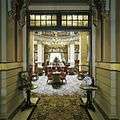 Hallway passage on ground floor level
Hallway passage on ground floor level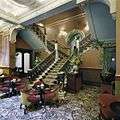 Hotel Des Indes, part of the central hall
Hotel Des Indes, part of the central hall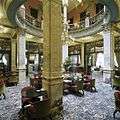 Ground floor rotunda with restaurant
Ground floor rotunda with restaurant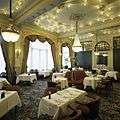 Dining hall
Dining hall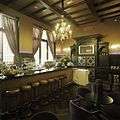 Bar
Bar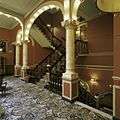 Staircase on the second floor
Staircase on the second floor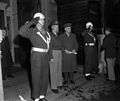 1951: Dwight Eisenhower and general Kruls leaving Hotel Des Indes
1951: Dwight Eisenhower and general Kruls leaving Hotel Des Indes
Notes
References
- "Famous Dancer Dead". Derby Daily Telegraph. 1931-01-23. p. 4. Retrieved 2019-01-20 – via British Newspaper Archive.
- "In Memoriam: Anna Pavlova. De groote Russische danseres" [In Memoriam: Anna Pavlova. The great Russian dancer.]. De Indische Courant (in Dutch). 1931-02-28. p. 13. Retrieved 2019-01-20 – via Koninklijke Bibliotheek/Delpher.
- "Des Indes opnieuw in de verkoop" [Des Indes again for sale] (PDF). NRC Handelsblad (in Dutch). 7 September 1991.
- "Nieuwe eigenaar en renovatie voor Hotel des Indes" [New owner and renovation for Hotel des Indes] (PDF). De Posthoorn (in Dutch). 27 November 2002.
- "Hotel Des Indes treedt toe tot de wereldtop van exclusieve hotels" [Hotel Des Indes ascends into the world top of exclusive hotels] (in Dutch). Uitgeverij PS. 6 December 2018. Retrieved 2019-01-21 – via Hospitality-Management.nl.
- "Gevonden op Delpher - De Tijd : godsdienstig-staatkundig dagblad". www.delpher.nl (in Dutch). Retrieved 2019-03-01.
- "LAATSTE BERICHTEN". July 18, 1887 – via Koninklijke Bibliotheek.
- "Gevonden op Delpher - Het nieuws van den dag : kleine courant". www.delpher.nl.
- "Gevonden op Delpher - Provinciale Noordbrabantsche en 's Hertogenbossche courant". www.delpher.nl.
- "Gevonden op Delpher - Algemeen Handelsblad". www.delpher.nl.
- "BINNENLAND". July 18, 1883 – via Haags Gemeentearchief.
- "Gevonden op Delpher - Algemeen Handelsblad". www.delpher.nl.
- "LAATSTE BERICHTEN". December 8, 1900 – via Stadsarchief Enschede.
- "Gevonden op Delpher - Haagsche courant". www.delpher.nl.
- "BINNENLAND. DEN HAAG 15 JULI". July 16, 1885 – via Koninklijke Bibliotheek.
- "Binnenlandsche Berichten. DELFT, 23 Juli 1888. STATEN-GENERAAL. Tweede Kamer". July 24, 1888 – via Koninklijke Bibliotheek.
- "Gevonden op Delpher - Haagsche courant". www.delpher.nl.
- "BINNENLAND". August 9, 1890 – via Koninklijke Bibliotheek.
- "Gevonden op Delpher - Het nieuws van den dag : kleine courant". www.delpher.nl.
- De Tijd (in Dutch). 1890-11-29. p. 2 http://resolver.kb.nl/resolve?urn=ddd:010385126:mpeg21:a0006. Retrieved 2019-01-20 – via Koninklijke Bibliotheek/Delpher. Missing or empty
|title=(help) - Haagsche Courant (in Dutch). 1891-07-17. p. 1 https://resolver.kb.nl/resolve?urn=MMKB04:000119238:mpeg21:p001. Retrieved 2019-01-20 – via Koninklijke Bibliotheek/Delpher. Missing or empty
|title=(help) - De Tijd (in Dutch). 1892-08-23. p. 2 https://resolver.kb.nl/resolve?urn=ddd:010990197:mpeg21:p002. Retrieved 2019-01-20 – via Koninklijke Bibliotheek/Delpher. Missing or empty
|title=(help) - Algemeen Handelsblad (in Dutch). 1895-09-14. p. 3 https://resolver.kb.nl/resolve?urn=ddd:010161635:mpeg21:p003. Retrieved 2019-01-20 – via Koninklijke Bibliotheek/Delpher. Missing or empty
|title=(help) - De Tijd (in Dutch). 1896-07-08. p. 2 http://resolver.kb.nl/resolve?urn=ddd:010991078:mpeg21:a0007. Retrieved 2019-01-20 – via Koninklijke Bibliotheek/Delpher. Missing or empty
|title=(help) - Haagsche Courant (in Dutch). 1897-07-13. p. 1 https://resolver.kb.nl/resolve?urn=MMKB04:000122364:mpeg21:p001. Retrieved 2019-01-20 – via Koninklijke Bibliotheek/Delpher. Missing or empty
|title=(help) - Haagsche Courant (in Dutch). 1899-03-20. p. 1 https://resolver.kb.nl/resolve?urn=MMKB04:000126563:mpeg21:p013. Retrieved 2019-01-20 – via Koninklijke Bibliotheek/Delpher. Missing or empty
|title=(help) - De Telegraaf (in Dutch). 1899-06-09. p. 1 https://www.delpher.nl/nl/kranten/view?coll=ddd&identifier=ddd:110553365:mpeg21:a0008. Retrieved 2019-01-20 – via Koninklijke Bibliotheek/Delpher. Missing or empty
|title=(help) - De Tijd (in Dutch). 1899-10-19. p. 2 http://resolver.kb.nl/resolve?urn=ddd:010407810:mpeg21:a0015. Retrieved 2019-01-20 – via Koninklijke Bibliotheek/Delpher. Missing or empty
|title=(help) - Nieuwsblad van het Noorden (in Dutch). 1901-02-06. p. 1 http://resolver.kb.nl/resolve?urn=ddd:010895143:mpeg21:a0005. Retrieved 2019-01-20 – via Koninklijke Bibliotheek/Delpher. Missing or empty
|title=(help) - Lex Dalen Gilhuys (1981). 100 jaar Hotel Des Indes: 100 jaar wereldvenster [100 years Hotel Des Indes: 100 years a window of the world] (in Dutch). Voorburg: Crest Hotels. OCLC 65442313.
- Haagsche Courant (in Dutch). 1906-09-25. p. 5 https://resolver.kb.nl/resolve?urn=MMKB04:000129919:mpeg21:a0030. Retrieved 2019-01-20 – via Koninklijke Bibliotheek/Delpher. Missing or empty
|title=(help) - De Tijd (in Dutch). 1906-11-19. p. 2 https://resolver.kb.nl/resolve?urn=ddd:010409052:mpeg21:p002. Retrieved 2019-01-20 – via Koninklijke Bibliotheek/Delpher. Missing or empty
|title=(help) - Delftsche Courant (in Dutch). 1909-04-08. p. 1 http://resolver.kb.nl/resolve?urn=MMKB08:000138855:mpeg21:a0002. Retrieved 2019-01-20 – via Koninklijke Bibliotheek/Delpher. Missing or empty
|title=(help) - Haagsche Courant (in Dutch). 1909-06-03. p. 5 https://resolver.kb.nl/resolve?urn=MMKB04:000131328:mpeg21:p005. Retrieved 2019-01-20 – via Koninklijke Bibliotheek/Delpher. Missing or empty
|title=(help) - "Roosevelt in Den Haag" [Roosevelt in The Hague]. Algemeen Dagblad (in Dutch). 1910-04-30. p. 2. Retrieved 2019-01-20 – via Koninklijke Bibliotheek/Delpher.
- Het Nieuws van den Dag (in Dutch). 1911-04-21. p. 5 http://resolver.kb.nl/resolve?urn=ddd:010108687:mpeg21:a0074. Retrieved 2019-01-20 – via Koninklijke Bibliotheek/Delpher. Missing or empty
|title=(help) - Haagsche Courant (in Dutch). 1911-07-07. p. 5 https://resolver.kb.nl/resolve?urn=MMKB04:000135268:mpeg21:p005. Retrieved 2019-01-20 – via Koninklijke Bibliotheek/Delpher. Missing or empty
|title=(help) - Haagsche Courant (in Dutch). 1912-08-12. p. 1 http://resolver.kb.nl/resolve?urn=MMKB04:000137300:mpeg21:a0065. Retrieved 2019-01-20 – via Koninklijke Bibliotheek/Delpher. Missing or empty
|title=(help) - Het Nieuws van den Dag (in Dutch). 1913-09-12. p. 12 https://resolver.kb.nl/resolve?urn=ddd:010109947:mpeg21:p012. Retrieved 2019-01-20 – via Koninklijke Bibliotheek/Delpher. Missing or empty
|title=(help) - Algemeen Handelsblad (in Dutch). 1921-06-14. p. 2 http://resolver.kb.nl/resolve?urn=ddd:010654924:mpeg21:a0014. Retrieved 2019-01-20 – via Koninklijke Bibliotheek/Delpher. Missing or empty
|title=(help) - "Japansch bezoek aan onze stad" [Japanese visit to our city.]. Haagsche Courant (in Dutch). 1925-04-28. p. 13. Retrieved 2019-01-20 – via Koninklijke Bibliotheek/Delpher.
- De Telegraaf (in Dutch). 1926-10-12. p. 5 http://resolver.kb.nl/resolve?urn=ddd:010564725:mpeg21:a0198. Retrieved 2019-01-20 – via Koninklijke Bibliotheek/Delpher. Missing or empty
|title=(help) - Het Vaderland (in Dutch). 1932-05-17. p. 1 http://resolver.kb.nl/resolve?urn=ddd:010014126:mpeg21:a0008. Retrieved 2019-01-20 – via Koninklijke Bibliotheek/Delpher. Missing or empty
|title=(help) - "De president van Liberia" [The president of Liberia]. Provinciale Noordbrabantsche en 's Hertogenbossche Courant (in Dutch). 1927-09-28. p. 8. Retrieved 2019-01-20 – via Koninklijke Bibliotheek/Delpher.
- "Paderewski in ons land" [Paderewski in our country]. Het Vaderland (in Dutch). 1929-03-10. p. 1. Retrieved 2019-01-20 – via Koninklijke Bibliotheek/Delpher.
- Haagsche Courant (in Dutch). 1929-07-20. p. 2 http://resolver.kb.nl/resolve?urn=MMKB04:000145857:mpeg21:a0108. Retrieved 2019-01-20 – via Koninklijke Bibliotheek/Delpher. Missing or empty
|title=(help) - De Telegraaf (in Dutch). 1930-10-05. p. 3 http://resolver.kb.nl/resolve?urn=ddd:110570380:mpeg21:a0140. Retrieved 2019-01-20 – via Koninklijke Bibliotheek/Delpher. Missing or empty
|title=(help) - De Tribune (in Dutch). 1929-08-14. p. 2 http://resolver.kb.nl/resolve?urn=ddd:010464609:mpeg21:a0029. Retrieved 2019-01-20 – via Koninklijke Bibliotheek/Delpher. Missing or empty
|title=(help) - Algemeen Handelsblad (in Dutch). 1930-01-13. p. 5 http://resolver.kb.nl/resolve?urn=ddd:010660973:mpeg21:a0194. Retrieved 2019-01-20 – via Koninklijke Bibliotheek/Delpher. Missing or empty
|title=(help) - Het Vaderland (in Dutch). 1930-01-22. p. 2 http://resolver.kb.nl/resolve?urn=ddd:010012704:mpeg21:a0051. Retrieved 2019-01-20 – via Koninklijke Bibliotheek/Delpher. Missing or empty
|title=(help) - "Aankomst van Kellogg - De nieuwe rechter in het Permanente Hof van Internationale Justitie" [Arrival of Kellogg - The new judge in the Permanent Court of International Justice]. Haagsche Courant (in Dutch). 1930-10-20. p. 17. Retrieved 2019-01-20 – via Koninklijke Bibliotheek/Delpher.
- Haagsche Courant (in Dutch). 1931-08-17. p. 5 http://resolver.kb.nl/resolve?urn=MMKB04:000148397:mpeg21:a0082. Retrieved 2019-01-20 – via Koninklijke Bibliotheek/Delpher. Missing or empty
|title=(help) - Haagsche Courant (in Dutch). 1934-08-04. p. 2 http://resolver.kb.nl/resolve?urn=MMKB04:000148212:mpeg21:a0120. Retrieved 2019-01-20 – via Koninklijke Bibliotheek/Delpher. Missing or empty
|title=(help) - Haagsche Courant (in Dutch). 1936-09-24. p. 5 http://resolver.kb.nl/resolve?urn=MMKB04:000148894:mpeg21:a0133. Retrieved 2019-01-20 – via Koninklijke Bibliotheek/Delpher. Missing or empty
|title=(help) - "Het bezoek van prins Nicolaas van Roemenië" [The visit of Prince Nicholas of Romania]. Het Vaderland (in Dutch). 1933-07-13. p. 1. Retrieved 2019-01-20 – via Koninklijke Bibliotheek/Delpher.
- De Telegraaf (in Dutch). 1934-03-28. p. 5 https://resolver.kb.nl/resolve?urn=ddd:110572051:mpeg21:p005. Retrieved 2019-01-20 – via Koninklijke Bibliotheek/Delpher. Missing or empty
|title=(help) - Algemeen Handelsblad (in Dutch). 1935-06-13. p. 1 http://resolver.kb.nl/resolve?urn=ddd:010663990:mpeg21:a0015. Retrieved 2019-01-20 – via Koninklijke Bibliotheek/Delpher. Missing or empty
|title=(help) - "Het bezoek van minister-president Lyons" [The visit of Prime Minister Lyons]. Haagsche Courant (in Dutch). 1937-06-22. p. 13. Retrieved 2019-01-20 – via Koninklijke Bibliotheek/Delpher.
- Algemeen Handelsblad (in Dutch). 1937-08-12. p. 3 http://resolver.kb.nl/resolve?urn=ddd:010665126:mpeg21:a0123. Retrieved 2019-01-20 – via Koninklijke Bibliotheek/Delpher. Missing or empty
|title=(help) - Algemeen Handelsblad (in Dutch). 1955-04-27. p. 4 https://resolver.kb.nl/resolve?urn=KBNRC01:000041691:mpeg21:p004. Retrieved 2019-01-20 – via Koninklijke Bibliotheek/Delpher. Missing or empty
|title=(help) - Algemeen Handelsblad (in Dutch). 1939-09-17. p. 4 http://resolver.kb.nl/resolve?urn=ddd:010664735:mpeg21:a0103. Retrieved 2019-01-20 – via Koninklijke Bibliotheek/Delpher. Missing or empty
|title=(help) - Utrechts Volksblad (in Dutch). 1939-09-14. p. 6 http://resolver.kb.nl/resolve?urn=ddd:010940678:mpeg21:a0124. Retrieved 2019-01-20 – via Koninklijke Bibliotheek/Delpher. Missing or empty
|title=(help) - De Tijd (in Dutch). 1948-10-20. p. 1 https://resolver.kb.nl/resolve?urn=ddd:011200932:mpeg21:p001. Retrieved 2019-01-20 – via Koninklijke Bibliotheek/Delpher. Missing or empty
|title=(help) - De Volkskrant (in Dutch). 1956-04-17. p. 5 https://resolver.kb.nl/resolve?urn=ABCDDD:010842792:mpeg21:p005. Retrieved 2019-01-20 – via Koninklijke Bibliotheek/Delpher. Missing or empty
|title=(help) - "Kennedy's zuster in ons land" [Kennedy's sister in our country]. Limburgsch dagblad (in Dutch). 1962-04-14. p. 3. Retrieved 2019-01-20 – via Koninklijke Bibliotheek/Delpher.